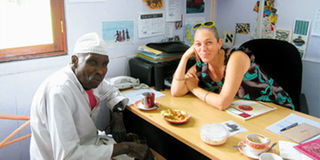COVER: A day with Tanzanian legendary poet, Haji Gora

Haji Gora (left) with a friend in Zanzibar.
PHOTO | COURTESY
What you need to know:
- He is one of the most respected poets in Zanzibar, yet he has nothing to show for his famous works
- Haji Gora started writing poems through poetry recital challenges in the 1950s in Zanzibar. His first composition was called ‘Dunia la rangi mbili’ which was released in the 1950s
Haji Gora lies on his bed all day in his Kanzu, staring at the ceiling. His home in Mtoni Kidato, Zanzibar is among many houses that are built closely together, with a poor sewerage system and is home to low income earners.
The locality is commonly known as ‘Uswahilini.’ A small window allows some light into the blue-walled room and the door remains open most of the time. The children play outside the house while some women and girls cook.
He is used to such visits, he says. More visits are from scholars and people who have some knowledge of his work and want ‘something’ from him, an interview mostly. Although they seem to come less and less nowadays since he was bedridden.
The name Haji Gora would probably not strike a nerve on hearing it, unless you studied literature or are keen to follow who-is-who in the literary world. At 81, the renowned poet has travelled the world, recited his poems on various platforms and festivals. Yet, little is said about him at home.
“I am sad on how artists are not valued here. Here I am, unwell. After a long life as an artist, I cannot take care of myself and no one else really cares about my welfare. Scholars who seek to hear of my work come here. All they want to hear about is my poems, my work, not me,” he says. He recalls his trip to Holland in 1999 where he recited his poems at a literary festival. Many praised him and liked him. Many foreigners still do.
In his view, there are some forms of entertainment such as football which are valued and given preference more than art in Tanzania. Poetry is definitely not given any esteem here, he says.
“An artist is the mirror of the society and he speaks for the people’s interests. Why is he not valued as a footballer who doesn’t even have half of a poet’s role?” he wonders.
His daughter, Acha Gora, 28, has been living with her parents and her four children for the past two years. Acha says she would never pursue the Arts even though she writes poems for pleasure.
“Look at my father. He has done so much work in the Arts. Yet he is not appreciated in the same manner. What good did it do him? What good shall it do me?”
Mzee Haji never thought he would venture into poetry when he was young. He remembers to have done so many diverse works to earn a living as a young Zanzibari. Born in Tumbatu Island in 1933, he worked as a fisherman and a seaman for many years. He even worked in construction as a day-worker. And once he worked as a houseboy for an Indian woman. He recalls how she would boss him around. “Haji ee, she would call me and tell me to sweep the floor”. But the moment I had the broom, she would tell me to check on the children. I thought it was madness. So I quit.”
His father, Nahodha Gora Haji had four wives. Haji’s mother was Mize Mjumbe Juma, a peasant who gave birth to four children. The first two were girls, Sida Gora Haji and Kazija Gora Haji followed by Haji and his twin brother, Mjumbe. He was named after their maternal grandfather. Mjumbe died young.
Mzee Haji says that he never went to school, just attended Madrassa, where he learnt Islamic knowledge as a child. He didn’t know how to write but knew how to read until later when he decided to learn. He remembers how it happened that he wasn’t enrolled in school. His grandmother sent him to his aunt where he stayed for a long while after his father had travelled. Although his grandmother didn’t want Haji to go to school, he says he doesn’t regret it. “Formal education was not my blessing,” he says.
He recalls how he started writing poems; it was through ngoma he says. He would go to the traditional dance events where people would do a recital challenge. One person would sing something and the other would respond. It was more or less like a form of debate using metaphors and language with a hidden meaning.
After a while, he joined a Taarab group and learnt how to compose songs. His first composition was called ‘Dunia la rangi mbili’ (The world of two colours) which was released in the 1950s.
Sometimes, Mzee Haji would use personal experiences in his songs. Once, he had a sharp argument with his wife. He then composed the song ‘Si Chochote’ (You are nothing) which can also be read as a poem.
The first verse says, Si chochote si lolote (You are nothing)/Nikikukosa sijuti (I won’t regret to lose you)/Pendo lako tofauti (Your love is different)/Utanionesha nini (What will you show me)/Utafanya lipi geni (What new will you do). His wife was in the audience when he sang it. She wasn’t very happy.
He wrote another poem about his experience with education. The poem ‘Kisomocha Manufaa’ (beneficial learning) reflected a period when elderly people were being encouraged to go to school.
He was among those who joined the movement in the 1970s and learnt how to read and write. Before that, something happened that pushed him to that decision. He went to a ngoma event where he wasn’t performing. But someone there provoked him to speak. A man spoke a riddle that impressed him. That man’s name was Makame Haji Kitenga. This man knew how to read and write. Haji was so impressed by him that he thought he should learn to read too.
As he takes out his books and documents about his work from a suitcase, he mentions the members of his family. It troubles Mzee Haji that he cannot remember his first wife’s name. They divorced in the late 1950s and had four children together, one died. His second wife was Bahati Makame Kombo with whom he had four children as well, one died. They divorced in 1976. A year later, he married his third wife whose name he has a hard time remembering. “I am growing old,” he says. He later recalls it to be Patima Pandu Mdungi, she passed away on December 14, 2014 due to an illness. They had seven children together, among whom one has died. He also married Miza Ngwali Khamis at the same time he married Patima. But they divorced, and she is now also deceased. He had two children with her, one died.
Haji Gora says it is interesting to see how the forms of poetry have changed over the years. Poetry is changing faces. Back in his days, they were used to having live ‘poetry recital debates’.
They would challenge each other about real issues that affect the society using poetry. He recalls one man, Sheikh Mwinyi who was also known as ‘Jiwe Zito’ who was in a recital challenge with him once. His stand was that a woman should be beaten, Haji refuted his ideas.




